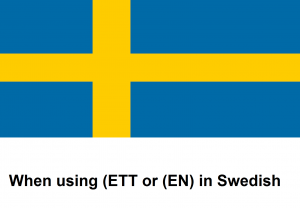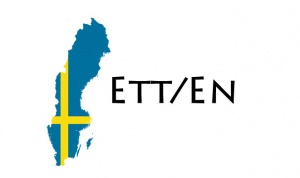Difference between revisions of "Language/Swedish/Grammar/When-use-Ett-or-En"
Jump to navigation
Jump to search
(When using (ETT or (EN) in Swedish) |
|||
| Line 4: | Line 4: | ||
Hello everybody, | Hello everybody, | ||
In today's lesson you will learn | In today's lesson you will learn '''WHEN TO USE ETT & EN''' in Swedish. | ||
Feel free to edit this page by adding new words and expressions ! | Feel free to edit this page by adding new words and expressions ! | ||
Good learning ! :) | Good learning ! :) | ||
__TOC__ | |||
== '''INDEFINITE FORM''' == | |||
In Swedish we have two words to choose between when we want to write about nouns in indefinite form: En or Ett. | |||
. | . | ||
==='''Examples'''=== | |||
*Ett bord = A table | |||
*En hund = A dog | |||
*Ett äpple = An apple | |||
*En skola = A school | |||
== '''COMMON MISTAKE''' == | |||
*En (Swedish article) = An (English article) | |||
*Ett (Swedish article) = A (English article) | |||
This is not true. There is no grammatical rule to know when to use En or Ett, you just simply have to learn them. | |||
. | . | ||
== '''When | == '''DEFINITE FORM''' == | ||
When we want a noun to be in definite form we add a suffix to the noun; -en, -n or -et. | |||
For example: | |||
*<u>Ett</u> bord = Bord<u>et</u> | |||
*<u>En</u> hund = Hund<u>en</u> | |||
*<u>Ett</u> äpple = Äppl<u>et</u> | |||
*<u>En</u> skola = Skola<u>n</u> | |||
<blockquote>Here we just add -n since the word already ends with a vowel.</blockquote> | |||
As you might have noticed, you can know which suffix to use by looking at the indefinite article. | |||
*If it's an "En-word", the suffix is -en or -n. | |||
*If it's an "Ett-word", the suffix is -et. | |||
== When to use ETT or EN in Swedish (table in several languages) == | |||
{| class="wikitable sortable" | {| class="wikitable sortable" | ||
|- | |- | ||
| Line 75: | Line 108: | ||
|} | |} | ||
== | ==Videos== | ||
<youtube>w_Yrfx1nHLw</youtube> | |||
<youtube>jGi3LShBCp4</youtube> | |||
<youtube>FF1m6h3TddU</youtube> | |||
=='''Authors'''== | =='''Authors'''== | ||
[http://polyglotclub.com/member/brainwashme Brainwashme] | [http://polyglotclub.com/member/brainwashme Brainwashme] | ||
Revision as of 18:06, 8 September 2021
.
Hello everybody,
In today's lesson you will learn WHEN TO USE ETT & EN in Swedish.
Feel free to edit this page by adding new words and expressions !
Good learning ! :)
INDEFINITE FORM
In Swedish we have two words to choose between when we want to write about nouns in indefinite form: En or Ett.
.
Examples
- Ett bord = A table
- En hund = A dog
- Ett äpple = An apple
- En skola = A school
COMMON MISTAKE
- En (Swedish article) = An (English article)
- Ett (Swedish article) = A (English article)
This is not true. There is no grammatical rule to know when to use En or Ett, you just simply have to learn them.
.
DEFINITE FORM
When we want a noun to be in definite form we add a suffix to the noun; -en, -n or -et.
For example:
- Ett bord = Bordet
- En hund = Hunden
- Ett äpple = Äpplet
- En skola = Skolan
Here we just add -n since the word already ends with a vowel.
As you might have noticed, you can know which suffix to use by looking at the indefinite article.
- If it's an "En-word", the suffix is -en or -n.
- If it's an "Ett-word", the suffix is -et.
When to use ETT or EN in Swedish (table in several languages)
| ENGLISH | SWEDISH | PRONUNCIATION IN
ENGLISH |
BRAZILIAN
PORTUGUESE |
| A table | Ett bord | eht bohr | Uma mesa |
| A dog | En hund | ehn hoon | Um cachorro |
| An apple | Ett äpple | eht eh pleh | Uma maçã |
| A school | En skola | ehn skoo lah | Uma escola |
| The table | Bordet | bohr deht | A mesa |
| The dog | Hunden | hoon dehn | O cachorro |
| The apple | Äpplet | eh pleht | A maçã |
| The school | Skolan | skoh lahn | A escola |
Videos

